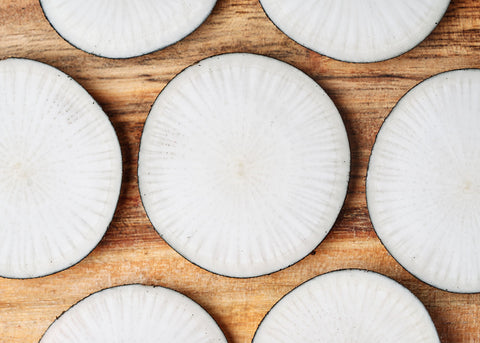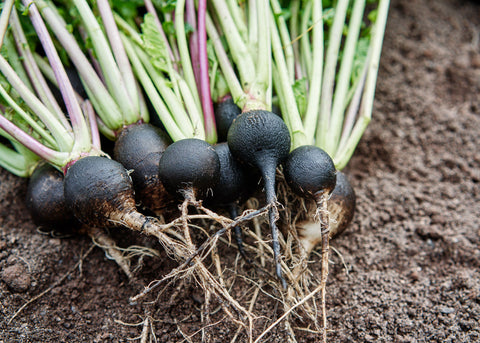





Round Black Spanish - Radish Seeds
🚚 FREE SHIPPING for all orders over $99!
Plant spring radish seeds directly in the garden starting 4-6 weeks before average last spring frost. Optimum soil temperature for seed germination is 50-65 degrees. Since they mature so quickly, spring radishes are often planted with carrots and parsnips, between slowly growing cole crops, or between small tomato and pepper plants. Plant every 2-3 weeks for a continued harvest until about 4 weeks after average last frost. Can be sown again in early fall. Plant winter radish varieties 6-8 weeks before average first frost.
Scientific name: raphanus sativas
Days to maturity: 60
Seed depth: 1/2"
Days to sprout: 3-10
Plant spacing: 2-3" spring types / 6" winter types
Row spacing: 1'
Light requirements: sunny
Plant height: 6-8"
Life cycle: annual
Frost hardy: yes
NON-GMO
Open-pollinated seeds perfect for seed saving
HIGH QUALITY
Third-party lab tested to ensure strong germination and seed vitality
100% SATISFACTION
We'll make it right if there's a problem
HAND PACKED
Created with love in Pottstown, PA
ORGANIC SEED
140+ Organic and Certified Naturally Grown varieties available
FREE SHIPPING
Fast & free shipping on orders $99+
This one is pretty spicy but very yummy. Definitely not as black as the pictures show but maybe I harvested early.
Hello Sommer! Thank you for your thoughtful feedback on the Round Black Spanish Radish Seeds. We're pleased to hear that you're enjoying the flavorful spiciness of these radishes. It's not uncommon for their appearance to differ slightly from pictures, as factors like harvest timing and growing conditions can influence color. The spiciness you've noticed is due to compounds called glucosinolates, which are a natural defense mechanism in radishes. When radishes experience stress, like heat or nutrient imbalances, they produce more glucosinolates, resulting in a spicier taste. Harvesting radishes early, before they face prolonged heat, can indeed help manage their spiciness. If you have more insights to share or questions to ask, feel free to reach out. Happy gardening!


